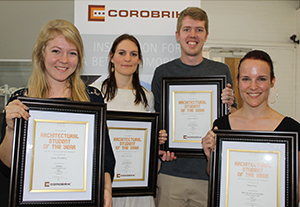
Lana Bramley (winner), Petru du Toit (second place),
Sinjon Moffett (third place), and Nina Nel
(best use of brick in a design) were
winners at the Corobrik Architecture
Student of the Year competition.
Photo: Leonie Bolleurs
During the recent announcement of the Corobrik Architecture Student of the Year, Lana Bramley was named regional winner in the Free State. Bramley is currently a master’s degree student in the Department of Architecture at the University of the Free State (UFS).
For her dissertation, she examined the design of an art gallery as a liminal architectural intervention, questioning the rigid boundaries of the UFS Campus. Bramley obtained distinctions for her Architecture dissertation, Design dissertation, and for Construction.
Bramley will join Roodt Architects next year.
The following students were also named winners in this year’s regional competition:
- Best use of brick in a design: Nina Nel
- Second place in the Corobrik Architectural student of the year competition (regional): Petru du Toit
- Third place in the Corobrik Architectural student of the year competition (regional): Sinjon Moffett
From the master’s class, a total of 27 students obtained distinctions (nine for Design dissertation, 12 for Construction and six for Architecture dissertation). Prof Jan Smit and Henry Pretorius, Head of the Department of Architecture, awarded two prizes respectively to the best Technical Design student, Janrie Haarhoff, and the best Architecture dissertation student, Petru du Toit.
Musa Shangase, Commercial Director of Corobrik, congratulated students on the quality of their work. It is the 30th year this competition has been presented by Corobrik, a company that is 114 years old, to encourage talent in this profession. The national winner is expected to be announced in May 2017.